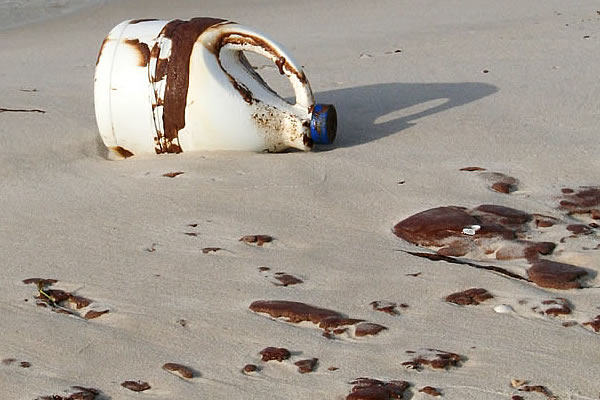
This gunk-covered bleach bottle washed ashore after the Deepwater Horizon tragedy. Photo by Andy Brack.
By Andy Brack, editor and publisher | State Republicans, often obsessed with spanking Democrats for backing a “nanny state” to take care of the less fortunate, are blind to their own frightening vision, an Anita Bryant free-market dream where just about everything goes, except what you do in the bedroom.
![]() This worldview would find guns everywhere. Developers and big companies would overrule the public’s interest in preserving South Carolina’s special places. Public money would pay for private schools. People would be at their own peril in finding good health care, sending tens of thousands routinely to emergency rooms for primary care. And oil wells — well, they would be just off the horizon of our coast, free to spew gunk whenever humans make errors.
This worldview would find guns everywhere. Developers and big companies would overrule the public’s interest in preserving South Carolina’s special places. Public money would pay for private schools. People would be at their own peril in finding good health care, sending tens of thousands routinely to emergency rooms for primary care. And oil wells — well, they would be just off the horizon of our coast, free to spew gunk whenever humans make errors.
Here’s free advice to South Carolina Republicans, blinded by business, deaf to the coastal quality of life: You’d better listen to what coastal communities are saying about exploring for oil and gas off the state’s $4 billion tourism shore. If you don’t, you just might pay at the Statehouse by being run out of office.
For the past few weeks, coastal communities have been voting, one after another, to oppose oil and gas exploration, as well as seismic testing in offshore waters: From Hilton Head Island to Beaufort, James Island and Folly Beach … from Isle of Palms and Port Royal to Charleston.
Their reasoning is pretty darn simple: They don’t want a Deepwater Horizon oil tragedy to happen here. They don’t want to risk marine life and the fragile coastal ecosystem. They don’t want to take a chance of spoiling the tourism boom that is helping residents recover from the recent recession.
If there were enough oil or gas off South Carolina’s coast to really be a substantial source, a different risk discussion could be had. But there’s just not, according to the S.C. Coastal Conservation League’s Hamilton Davis in a recent issue of Statehouse Report:
“Current estimates for reserves off the South Carolina coast equate to a 6-day supply of oil and gas at current U.S. consumption rates. If all economically recoverable fossil fuel reserves were extracted for the entire East Coast, you could only meet current oil demand for 132 days and current gas demand for 283 days.”
Is it worth the risk to have tar balls floating into estuaries and killing shrimp and fish? Is it worth scaring away tourists when oil-laced trash washes up on beaches? Is it worth causing the local economy to nosedive just to get six days of fossil fuel? Two words: Hell no.
Hold your state legislators accountable, particularly those who don’t live along the coast, and make sure they don’t ruin South Carolina’s coastal treasures. Tell them you’d rather they work on ways to spur people to invest in renewable resources, such as wind and solar energy.
* * *
In the recent issue of Statehouse Report, we outlined a different kind of risk — a risk of relying time and again on tax cuts to drive public policy. Having a tax worldview that precludes tax increases as politically unpopular and relies on tax cuts makes it tough for state government to boost revenues to pay for increased costs of everyday things, much less to improve programs to make things better.
National analysts Katherine Barrett and Rich Greene say the tax cut question is a “tricky game” for states. In a new article for the Council of State Governments, they challenge the notion that tax cuts always lead to improved state economies. Just look at the 20 states with the highest state-local tax burdens, they say. Six are in the Tax Foundation’s top 10 New Economy Index, which highlights states likely to have continuing economic health. On the other hand, Kansas, which had some of its largest tax cuts in history in 2012, continues to reel from the impact of lost revenue. Predicted “growth” just did not trickle in.
Barrett and Greene say businesses obviously will locate in states that offer low taxes — just as long as services and education are good. But they won’t move to or remain in a state where tax cuts impede services that businesses need, such as good roads to truck goods to market. And they won’t go where inconsistent tax policy yields fluctuating, unpredictable bills.
Bottom line: When tax cuts slash into the marrow of education, good roads and services, legislators risk making South Carolina less competitive, which means fewer jobs, less growth and a tougher time for everybody. Our leaders need to be a little more flexible on tax policy



 We Can Do Better, South Carolina!
We Can Do Better, South Carolina!
























